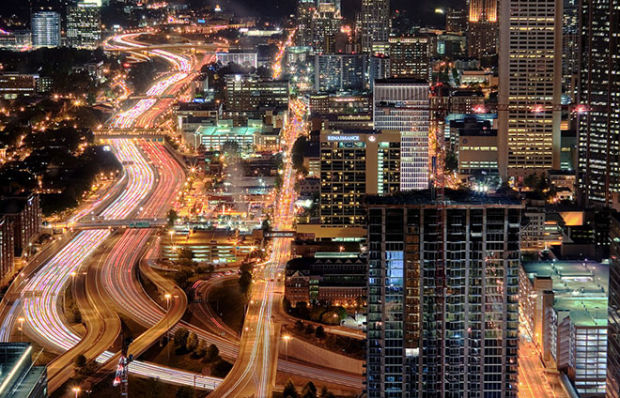By Jim Russell
 Downtown Atlanta, Georgia. (Photo: Brett Weinstein/Wikimedia Commons)
Downtown Atlanta, Georgia. (Photo: Brett Weinstein/Wikimedia Commons)Speaking of urban India, sociologist Saskia Sassen aptly describes the emerging segregation pattern of metropolitan Atlanta: “Our cities will, in good part, become two cities: one for the privileged (and we will see more green space in these areas) and the other for the poor who have no gated community to go to.” Suburban gated communities migrate into the core, pushing the poor to the periphery. The suburbanization of poverty in Atlanta:
Fully 88 percent of Atlanta’s poor live in the suburbs, according to Confronting Suburban Poverty in America, by Elizabeth Kneebone and Alan Berube of the Brookings Institution. Between 2000 and 2011, Atlanta’s suburban poor population grew by 159 percent, while the city’s poor population remained essentially flat.
Atlanta has been better known as home to the American dream on the cheap. In the Sun Belt, anyone can own a yard with a picket fence along with access to good schools and sparkling palaces of consumption. Sprawl was king and that was good, for a little while. Globalization would diffuse to Atlanta, as it has recently taken hold in Cleveland. The urban core would boom, primarily for white newcomers. But more about that in a moment.
For the poor moving out to the suburbs, aspirationally or otherwise, public transit does not extend far enough away from the city center. The folklore typically used to explain this infrastructure oversight is that affluent whites wanted to keep the riffraff in town, away from the suburban idyll. The built environment reflects the will of those in power. A perverse inversion, downtown Atlanta’s streetcar project:
Just before a shower of confetti and a sliced ribbon released a huge, navy blue beetle from its moorings on Tuesday, A.J. Robinson, the president of Central Atlanta Progress, had a word for the old fogeys who can’t fathom why his city has spent nearly $100 million to revive a streetcar system that has been dead these 50 years.
“Frankly, we did not build it for you,” Robinson said. “We built it because Atlanta is in a global competition for attracting future human capital. We built it so that we will have a shot at having our children and grandchildren stay here in Atlanta.” …
… If A.J. Robinson is right, if a generation of Georgians less smitten with cars and home ownership is in fact on the rise, millennials could become the anchor babies behind the revival of downtown Atlanta as an economic and political force.
“Millennials are definitely coming into the city of Atlanta. The recent census data verifies that,” a very happy Mayor Kasim Reed said after the ribbon-cutting. “Our population numbers are moving in a very competitive direction with the suburbs for the first time in a long time.”















